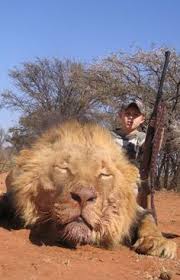
Chris Mercer
I’m concerned about the hype that has surrounded the report of the parliamentary committee on the issue of captive lion breeding. The report is the result of a colloquium which took place over two days in Cape Town in August 2018.
To the delight of animal activists - and the despair of the lion farmers, the report unequivocally calls for the Department of Environment (DEA) to start the process of phasing out lion farming and canned lion hunting. The actual committee resolution reads:
The Department of Environmental Affairs should as a matter of urgency initiate a policy and legislative review of Captive Breeding of Lions for hunting and Lion bone trade with a viewto putting an end to this practice.
There is not the slightest doubt that canned lion hunting is morally repugnant. Educate yourself by watching this short two minute video which will convince most ordinary people that lion trophy hunting is a horror show. https://youtu.be/GZCUO6s9E0I
An article in the Independent online by senior reporter Sheree Bega summarises the findings of the Parliamentary committee report, and also the reaction of various stakeholders and activists to that report.
https://www.iol.co.za/news/politics/outrage-over-lions-bred-to-be-killed-by-deep-pocketed-trophy-hunters-18159693
What worries me, reading everything that has been published in social media, is that while activists are falling over each other to congratulate themselves on their success, there seems to me to be an unwarranted optimism that the report is going to result in a ban on lion farming and canned hunting. My personal opinion is that this is naive.
Anyone who thinks that a report by a Parliamentary committee is going to result in a ban on canned lion hunting in the foreseeable future does not understand how conservation works in South Africa. You have to understand that conservation structures are so thoroughly captured by the hunting industry that they could almost be regarded as an arm of the hunting industry.
We have the ridiculous situation in South Africa that the struggling taxpayer is actually subsidising the obscenely wealthy business of killing wildlife for profit – by funding a captured regulator.
Once you understand that, you will not be shocked when you read that the request by the 12,000 leading conservation scientists of the world, the IUCN, to the South African government, to implement a ban on lion farming and canned hunting, fell on deaf ears.
So how do we know that the parliamentary committee report will also not fall on deaf ears in the DEA?
Parliament is far more compelling to the DEA than the IUCN. This report is a big step in the right direction and there will be consequences. So what do I expect to happen? Well nothing for quite some time. The South African government operates in a different time dimension to the rest of the universe; in the corridors of bureaucracy and legislation, years drift by like grains of sand.
However, the least we can expect is a general tightening up on animal welfare conditions within lion farms. That will be useful. But any attempt by the DEA to impose a ban on lion farming and canned hunting will be met with a barrage of court cases.
The hunting fraternity knows very well how to lobby and litigate ferociously. They’ve done so before, successfully, and they’ll do it again. Money to pay for the top-class lawyers who will fight their cause will flow like rivers from obscenely wealthy overseas asylums for rich animal abusers. Appeal after appeal will prolong the process for years if not decades. The South African legal system moves at a glacial pace.
But as the months and years drift by perhaps the next step will be for the committee to bring the report to Parliament for debate in the National Assembly. In that case, if you have tears, prepare to shed them now, because the debate will immediately become racialised and politicised.
South Africa’s torturous history of colonialism and apartheid has resulted in a government which is obsessed with ‘transformation.’ That is the buzzword to legitimise the taking of wealth from white people and redistributing it to people of colour i.e. ‘previously disadvantaged’.
In plain words the debate in the National Assembly will not be about animal welfare or ethics.
It will be about the racial composition of the lion farming industry.
And therein lies a huge weakness which will be seized upon, because this industry is - in the words of former DEA Minister Edna Molewa, ‘substantially un-transformed.’ Ie the people making money out of lion farming and canned hunting are almost entirely white.
Once the debate moves in that direction, then there is a dagger pointing at the heart of lion farming in the form of the new much-publicised government policy to expropriate land owned by white people without compensation and to redistribute it to people of colour. Lion farmers and canned hunting operators have far more to fear from land expropriation without compensation than they do from animal activists. Ironically, it may be the result of animal activism that lion hunting farms find themselves at the top of the list for expropriation.
What might happen to the lions in captivity if and when lion farms are expropriated does not bear thinking about.
What if I am wrong? What if Parliament eventually (years if not a decade) passes legislation which survives all the legal challenges, to bring lion farming and canned hunting to an end? We would still have to restrain our jubilation because one should never underestimate the resourcefulness of animal abusers. There would be a flurry of midnight flights, the captive Lions in South Africa would disappear like Scotch mist (or government funds in a state owned enterprise,) and the hunting magazines would suddenly be full of advertisements for lion hunts in neighbouring territories where government is weak, such as Mozambique or Zimbabwe.
Please don’t think that I’m saying: what’s the point? let’s all give up. On the contrary, it was our efforts as activists that resulted in this important colloquium and in the 20 years or so that I have been campaigning against lion trophy hunting, I have seen enormous changes for the better in terms of public awareness. Our efforts have raised public ire to the point where the hunting industry has split down the middle, with one half joining the clarion call for a ban. (not from any motive of animal welfare, to be sure, but rather out of fear that public disgust at canned lion hunting will drag down the whole trophy hunting business)
We must redouble our efforts to raise public awareness and to get foreign countries to ban the import of lion trophies.
Bringing to an end the captive breeding of lions for hunting purposes is a lifetime’s work and there are no quick fixes. In five years’ time, the reality is that canned lion hunting will still be happening.
So we go on…
